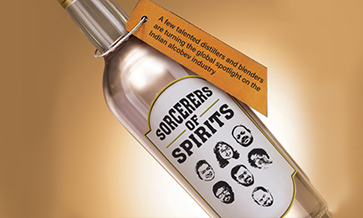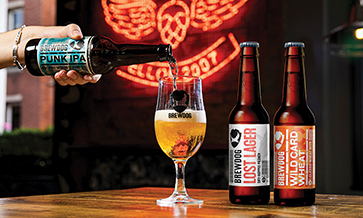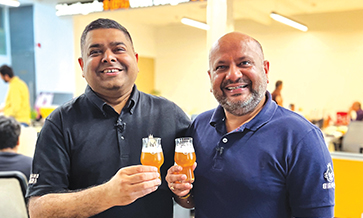Millennials, GenZ consumers want less alcohol, more choice. And GenX and Baby Boomers are not far behind!
From the explosion of rock-and-roll, to the ubiquity of denim and the adoption of wearable technology, young consumers have typically been the first to embrace new ideas. Nothing is new about this, but today, these revolutionary concepts are sweeping down the pike faster as technology allows young generations to glean information at record pace.
This phenomenon is now particularly relevant in the beverage sector, where young consumers are driving demand for new-age beverages in unprecedented ways. Research firm, The Hartman Group, refers to this emerging movement in its 2018 report as “modern beverage culture”.
It notes that beverages now play an outsized role in the lives of young consumers like Millennials, who are looking for beverages to provide not only convenience but also indulgence, experience, health and wellness.
As these young consumers drive the expanding role of beverages in our daily nutritional menu, it has accelerated change in the beverage segment, with disruption and innovation across categories – from water and juice to alcohol.
Functional beverages are where a lot of the action is, with the global market estimated to reach US$ 208 billion by 2024 on an 8.66% CAGR, according to data from Research and Markets.
Growth in the overall category, which includes energy drinks, fortified juices, sports drinks, dairy/alternative dairy, enhanced waters and ready-to-drink teas and coffees, is propelled by a growing inclination toward non-alcoholic beverages and a preference for functional drinks over fruit juices and carbonated beverages.
Alcohol consumption
As young consumers reach adulthood, they are also ushering in changes to alcohol consumption. According to a report from International Wine and Spirits Record (IWSR) titled ‘Global Opportunities in Low- and No-alcohol Drinks’, 52% of US consumers said they are trying to drink less alcohol.
This is leading to a booming market for new beverages. The global non-alcoholic beer market alone is estimated to jump from US$ 18.3 billion in 2020 to US$ 25 billion by 2024. The IWSR study predicts the overall category will see a CAGR of more than 38% by 2022.
Whatever their drink of choice, the data undoubtedly shows that consumers consider beverages an important part of their nutritional routine. As they become more interested and informed about nutrition and health, they eschew beverages perceived as less healthy in favour of those they believe will bolster health.
These consumers are clearly looking for beverages that can do more than ever – from hydration and satiety, to energy and cognitive support, and a substitute for other foods. But their parents aren’t all that far behind!
When it comes to beverages, Millennials are definitely ahead of the curve. This is likely because changing norms they were exposed to about food and eating during their youth and early adulthood shaped new ideas about what a beverage should be.
On average, 73% of Millennials usually have a beverage on-hand, and they are increasingly aspirational about what they drink. Although bottled water is their beverage of choice, Millennials are looking for new options.
Big opportunities
While this represents a big opportunity, interpreting Millennials’ motivations and psyche is not easy. To better understand them, research firm Digsite looked deeper into what connects Millennials to particular healthy beverages.
Among their findings: more than half say they drink water regularly because they are concerned about sugar; want healthier options; and need to hydrate during a workout.
Health was the top motivator in beverage choice. Millennials have a wide range of demands for their future beverages:
- Contains raw fruits or vegetables: 23%
- Naturally low in sugar and calories: 22%
- USDA organic certified: 15%
- Contains green vegetables: 12%
- Contains only locally grown ingredients
- Fair-trade certified.
Research carried out by flavour and fragrance company Givaudan across 6,000 European consumers shows that 60% of alcohol drinkers in Europe are reducing their consumption.
The key drivers behind this trend include improving general wellbeing (38%) saving money (33%) and improving physical fitness (31%).
Consumers seek out low/no alcohol products across three key occasions: low-key moments of the day (often at home, like reading outdoors, or taking a bath); moments of casual conversation (such as at a dinner party); and upbeat times shared with others (a night out with friends).
Despite this demand and the size of the opportunity, only a third of respondents in the survey said they were satisfied with current products on the market, suggesting greater innovation in the space is desperately needed.
Beer belly
With beer, the main health and wellness concern focuses on the effect beer consumption has on the waistline, according to a study by DSM Food Specialties. The company has been looking at how to formulate good-tasting, alcohol-free beers without gluten with wheat, rye and barley.
Another consumer trend within the no- and low-beer category is the popularity of low- and free-from gluten beers. DSM’s research found that just over half of beer drinkers worldwide found a gluten-free claim appealing.
Low- and no-alcohol beer represents the biggest opportunity in low- and no-alcohol drinks. In 2020 it is estimated at a total value of US$ 6.63 billion in Western Europe and is forecast to grow to US$ 9.42 billion by 2025.
Givaudan’s research groups ‘mindful’ drinkers into five categories with different attitudes towards alcohol moderation:
- ‘wellness warriors’ (seeking good health)
- ‘balanced hedonists’ (seeking fun)
- ‘self-control strivers’ (seeking control)
- ‘cautious conformer’ (seeking value and belonging)
- ‘pragmatic moderates’ (avoiding alcohol).
What is clear is that one size doesn’t fit all consumers or occasions, and this creates opportunities for drinks manufacturers to develop alternatives that are targeted at special moments or specific consumer profiles.
For example, top notes such as citrus create zingy excitement, berry notes are associated with fun, sociability and indulgence, and hops and botanical extracts can add complexity, sophistication and authenticity to the taste.
Mouth-feel and visual appeal are also important, and creating the right look and drinking experience is key to creating a more satisfying and mindful moment for consumers.
Understanding adults
Just when you thought you might have had Millennials figured out, along comes Generation Z. This is the generation born from 1997 onward – with the oldest among them having turned 24 years old in 2021. At nearly 86.5 million, it is already the largest generation in the US by a significant margin.
GenZ are just reaching adulthood, little is known about them, but they do seem to be taking the demands set by Millennials a step further. A study by Berenberg Research predicts GenZ will consume about 10% less alcohol per capita by age 49 than Millennials.
GenZ has concerns about health, hangovers and being shamed or judged on social media if they drink too much. GenZ is also more likely to support companies that share their values. Brands will need to show a commitment to sustainability and equality to gain this generation’s trust.
As they rise to maturity, GenerationX is now taking the baton from Baby Boomers as the next generation of responsibility. They now carry the burdens of mortgages, retirement savings and paying for their children’s college.
Now in their prime earning years, their views have also been coloured by some hard knocks due to economic setbacks. As a whole, GenX is industrious, self-reliant, hard-working and pragmatic.
They are also digitally savvy, financially responsible and socially conscious. When it comes to beverage choices, they are embracing many of the same ideas as their kids (the Millennials and GenZ).
Baby Boomers, the leaders of the counter-culture, were at the forefront of modern demands for individual choice, freedom from traditions and the demand for fresh, less-processed, organic foods and beverages. As they reach retirement age, they are the most active generation of seniors to-date.
Boomers are now redefining what it means to be 60+. They are health-conscious and increasingly looking for products that help them age well. So, like younger generations, they are embracing ideas of hydration and are receptive to products that will help them maintain quality of life as they age.
Interestingly, Baby Boomers still like their beer and wine, and they are drinking more than other generations. But more than 60% of this generation say they seek products with simple, recognisable ingredients, and want foods and beverages with as few additives as possible.
Re-visiting alcohol
Perhaps one of the most unlikely beverage segments to see a healthy makeover is alcohol. As consumers, especially those under age 40, take a more moderate stance on alcohol consumption, brands are working to provide beverages with all the great taste consumers expect from a beer or cocktails, with fewer calories and lower alcohol.
This includes new low-sugar spirits and malt-based canned beverages. Responsible indulgence is a key driver of this trend, but it is not just about low alcohol content. Young consumers, in particular, have new ideas about what types of alcohol they prefer.
The youngest drinkers are now choosing spirits like Mezcal, sparkling wine and hard seltzer over traditional beers and wines. Interestingly, these better-for-you drinks often tout attributes like low sugar and carbs and gluten-free above low alcohol content.
Young consumers are also looking for new experiences and flavours from alcoholic beverages, which is giving rise to hybrid drinks, such as hard kombuchas, coffee stouts and even beer/wine combinations. Innovation in novel formats, craftsmanship and authentic stories will help drive the rise of these drinks.
Experiential drinks
Beyond healthier options, most consumers today also expect beverages to help create balance in their lives, like helping them get through a busy day, or managing family and career demands. So it is not surprising they look to beverages for more than nutrition.
But these desires are highly personal, and what is important for some may not resonate for all. It might be about convenience, lifestyle balance, comfort or even new taste and texture experiences. Having a deep understanding of customers and creating products and messages around specific goals will feel personal.
Beverages that can help individuals feel better in the moment will support this concept, and consumers will curate a suite of products that they feel best addresses their individual needs and lifestyles.
The beverage segment has long faced accountability for environmental and sustainability standards, and this is only ramping up as consumer awareness and expectations around these issues grow. Nearly 90% of global consumers expect brands to invest in sustainability.
This increasingly means beverages are expected to contain sustainably-sourced ingredients. Packaging waste, particularly from plastics, is also of high concern, and the beverage category has had a large impact on the creation and growth of plastic packaging materials.
More than half of global consumers now say they are willing to pay extra for products from companies devoted to solving plastic waste issues, according to Innova’s Top Trends report, so this will continue to support initiatives to address these problems in beverage packaging, such as rPET and re-usable bottles.
In the end, it’s clear that younger generations are altering the food and beverage landscape – and innovative beverage products are in the forefront. At the same time, each generation does have specific preferences for the products they drink, but there are also many common denominators.
Brands will need to target these areas of convergence as they navigate the fragmented and fast-paced beverage space. Here are a few points of generational alignment:
- Authenticity is important for consumers across generations;
- Whether a product is about taste, health, ingredients or experience, brands must develop a strong, authentic story and tell it well;
- Packaging matters, especially with beverages, so brands need to break ground in developing product packaging options that solve plastic waste problems.
The focus on health is here to stay. As they become empowered to take control of their health and wellness, consumers are embracing ideals of holistic living at younger ages. They may have different priorities, but the endgame is to lessen the effects of aging, stay healthy and fit, and prevent future health issues.
They’ll adopt a comprehensive approach to achieving those goals. Choosing great beverages is only the beginning.
Courtesy: Cargill Inc. Learn about Cargill solutions for next-generation beverages at www.cargill.com/beverages














